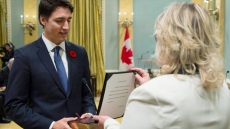TORONTO — Hammering away at seemingly minor details in a woman's account of her interactions with Jian Ghomeshi may seem harsh to members of the public, but a former prosecutor says it's a classic defence strategy meant to erode the witness's credibility.
The first two days of the former CBC Radio host's sex assault trial have focused on testimony from a woman who said Ghomeshi pulled hard on her hair while they were kissing in his car, then later grabbed her hair and punched her in the head at his home.
Under cross-examination, defence lawyer Marie Henein questioned precise details of the allegations, which date back to 2003, pressing the woman on whether she had worn hair extensions or if she had been pushed or pulled to the floor.
Ghomeshi has pleaded not guilty to four counts of sexual assault , which carry a maximum 18 months in jail, and a choking charge that has a potential maximum of life in prison.
The case has been closely watched and discussed on social media, with some expressing frustration or disbelief at the defence's focus on what they consider to be insignificant minutiae.
"Since when is how a woman's hair was styled such an important detail during a sexual assault? #Ghomeshi," one tweeted.
Henein's approach is "not surprising," said Lisa Ridgedale, a former Crown attorney turned defence lawyer in British Columbia.
"A defence lawyer's main job is to poke holes in the prosecutor's case and the way you poke holes, especially in a case where events happened in the past, is going through details," she said.
"You gather up all these details and then you discredit witnesses by having them contradict themselves on the details, either between witnesses or one witness itself."
Part of the Crown's preparation for trial is meeting with a witness to go over their prior statements and take note of any inconsistencies, Ridgedale said.
Unlike what's shown in legal dramas on television and in the movies, Crown attorneys in Canada aren't allowed to coach witnesses on their testimony, she said.

Instead, much of the process is simply getting the witness ready to deal with the stress of being in the spotlight and having someone challenge their recollections, she said.
"I don't want to freak out a witness completely to the point where...they decide they can't testify but if you put a witness on the stand with a good defence lawyer in a case like the Ghomeshi case, for instance, they're going to get annihilated if they're not prepared," she said.
"So it's good to let them know that they are going to try to discredit you, they are going to try to trick you, they are going to try and make it sound like you're making things up — just focus on the question, just give your answer."
That kind of groundwork can be particularly crucial in high-profile cases when witnesses can feel extreme pressure, said Daniel Lerner, a former assistant Crown attorney now with a private practice in Toronto.
Witnesses in those cases are also more likely to have spoken publicly about their experience, he said.
"If witnesses have given interviews or witnesses have talked about cases, there's going to be more than one statement out there or possibly more than one version of what the witnesses have said," he said.
It's also possible the witness's story has been distorted in the process, Lerner said.
"These are all important things for the prosecutor to know going in to the trial because the last thing you want, especially with a witness on the stand, is a giant surprise," he said.
The woman who testified against Ghomeshi on Monday and Tuesday alleged that the Toronto Star "twisted" her account in its coverage of the allegations.
While preparation is key, too much can backfire, Lerner said.
The criminal justice system requires the prosecution to disclose any relevant evidence it collects to the defence, including any new information that arises in meeting with witnesses, he said.
The defence has no such obligation, he said. "It is a one-way street in criminal law," he said.
Both lawyers said they instruct witnesses to simply tell the truth and admit what they don't remember rather than try to outsmart the defence.

"If they come across as guessing on the stand, they're not going to be believed," Lerner said.
"It's not like TV, it's not some type of chess game between them and the lawyer who's cross-examining them, they're just there as a witness."





